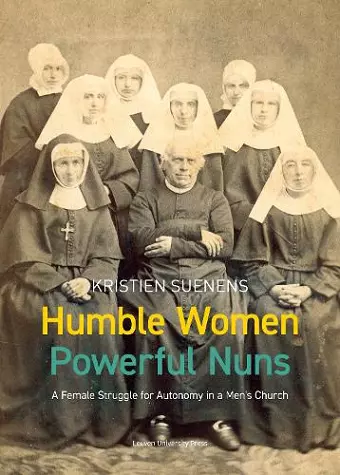Humble Women, Powerful Nuns
A Female Struggle for Autonomy in a Men's Church
Format:Paperback
Publisher:Leuven University Press
Published:22nd Jul '20
Currently unavailable, and unfortunately no date known when it will be back

The fascinating story of four ambitious Belgian religious women in a male world
Nineteenth-century female congregation founders could achieve levels of autonomy, power and prestige that were beyond reach for most women of their time. This book recounts the fascinating but ambiguous life stories of four Belgian religious women, hidden for a long time behind a curtain of modesty and mystery. A close reading of their personal writings unveils their conflicted existence: ambitious, socially committed, and audacious on the one hand, suffering, isolated, and dependent on men on the other, they were both victims and promotors of a nineteenth-century ideal of female submission. As religious and social entrepreneurs these women played an influential role in the revival of the Church and the development of education, health care and social provisions in modern Belgium. But, equally well, they were bound to rigid gender patterns and adherents of an ultramontane church ideology that fundamentally distrusted modern society.
This publication is GPRC-labeled (Guaranteed Peer-Reviewed Content).
The implications of Suenens’s research in 'Humble Women, Powerful Nuns' are quite striking: she has opened up many avenues for future work for other historians. How widespread was this view in the global Catholic Church, for example? Why is it that women with financial means were seemingly more exempt from gendered norms andspaces, and how were these lines drawn? How do we account for personality clashes in these complex, patriarchal worlds and the women who break out beyond the private sphere? Extending even further, this book offers a unique historical reflection on the problems still facing Catholic women today, in the form of a hierarchy of virtue inthe Catholic Church, in which personal virtue is pitted against public virtue in expectations of Catholic concepts of “womanhood” and “femininity”. This book should be of interest to scholars well beyond historians of women religious, as it represents new, interesting ways to think about women in history.
Rose Luminiello, Revue d'Histoire Ecclésiastique (vol. 117, 2022/1-2)
Suenens levert met 'Humble Women, Powerful Nuns' een innovatieve bijdrage aan het onderzoek naar de maatschappelijke positie van vrouwelijke congregatieleiders in negentiende-eeuws België en werpt een nieuw licht op een lang genegeerd onderwerp. Het boek is goed en vlot geschreven, en is doorspekt met citaten uit een gevarieerd bronnencorpus. Hoewel het werk door zijn opzet veel biografische gegevens en relaties tussen netwerken bevat, verzandt Suenens niet in biografische feitelijkheid door de vrouwen onderling voldoende te vergelijken. Een bijkomende meerwaarde is de aandacht die de auteur besteedt aan de relaties van Kestre, de Meeûs, Cornet en Telghuys met het mannelijke klerikale establishment, aristocratische lekenschenkers en andere religieuze vrouwen in binnen- en buitenland. 'Humble Women, Powerful Nuns' is daarmee een gedegen comparatief onderbouwde studie die de complexe maatschappelijke rol van vrouwelijke religieuzen in de negentiende eeuw kadert. Jirki Thibaut, bmgn — Low Countries Historical Review | Volume 136 (2021) | review 55, https://doi.org/10.51769/bmgn-lchr.11296
This engaging analysis undoubtedly adds to the scholarly enterprise of gaining a nuanced understanding of female’s involvement in (conservative) religious communities. Although the book focuses on the 19th century, the author relates to contemporary debates within the academic field of religion and gender.
Eline Huygens, Religion and Gender 11 (2021), DOI:10.1163/18785417-01101002
Suenens studie ger en inblick i det kvinnliga socialkaritativa ordenslivets utveckling i ett belgiskt perspektiv och illustrerar hur det kom att fungera som en plattform för kvinnors entreprenörskap, nätverksbyggande och frigörelse. Hon belyser också andlighet och religiös mentalitet och illustrerar den religiösa trons funktion som en drivkraft för de biograferade kvinnornas engagemang. Studien bekräftar tidigare forskning men ger också många nya infallsvinklar som kan vara värda att gå vidare med. Detta gäller inte minst den »romerska feminismen», manifesterad i den kyrkliga hierarkins allt starkare intresse av att använda sig av kvinnornas aktiva engagemang i den kyrkliga verksamheten – en trend som förstärkts på senare tid!
Yvonne Maria Werner, Kyrkohistorisk årsskrift 2021
This engaging analysis undoubtedly adds to the scholarly enterprise of gaining a nuanced understanding of female’s involvement in (conservative) religious communities. Although the book focuses on the 19th century, the author relates to contemporary debates within the academic field of religion and gender. In particular, Suenens applies commonly used concepts within the contemporary study of religion and gender such as, among other things, agency, submission, religious entrepreneurship, and autonomy, onto a historical case study.This book is thus not only of interest for historians working on religious and/or gender history, but also for sociologists and ethnographers examining contemporary religious communities and movements in relation to gender. Similar to certain current studies of gender and religion, this research aims to shed light onto the ‘individual motivation, or […] the strategies and challenges of female convent life that could lead to a more nuanced understanding […]’ (p. 19). In doing so, Suenens succeeds to go beyond the simple dichotomy of suppression versus autonomy, and reveals the complexity and ambivalence in female religious subjectivies.
Eline Huygens, Religion and Gender 11, 2021, https://brill.com/view/journals/rag/11/1/article-p148_20.xml, DOI:10.1163/18785417-01101002
ISBN: 9789462702271
Dimensions: 238mm x 170mm x 21mm
Weight: 710g
384 pages